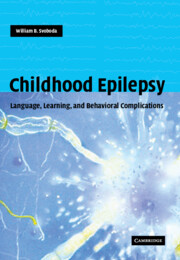Book contents
- Frontmatter
- Contents
- Preface
- Glossary
- 1 Looking ahead
- Part I Speech and language problems
- Part II Learning problems
- 12 Learning challenges
- 13 The development of learning
- 14 Learning difficulties
- 15 Learning problems with seizure types
- 16 Modifying factors
- 17 Transient cognitive impairments of epilepsy
- 18 Attention and alertness
- 19 Memory
- 20 Executive functioning
- 21 Academics
- 22 Antiepileptic medication effects
- 23 Effects of other therapies
- 24 Diagnosis
- 25 Gaining help
- 26 Frustrations of learning problems
- Part III Behavior problems
- Index
- References
23 - Effects of other therapies
from Part II - Learning problems
Published online by Cambridge University Press: 26 October 2009
- Frontmatter
- Contents
- Preface
- Glossary
- 1 Looking ahead
- Part I Speech and language problems
- Part II Learning problems
- 12 Learning challenges
- 13 The development of learning
- 14 Learning difficulties
- 15 Learning problems with seizure types
- 16 Modifying factors
- 17 Transient cognitive impairments of epilepsy
- 18 Attention and alertness
- 19 Memory
- 20 Executive functioning
- 21 Academics
- 22 Antiepileptic medication effects
- 23 Effects of other therapies
- 24 Diagnosis
- 25 Gaining help
- 26 Frustrations of learning problems
- Part III Behavior problems
- Index
- References
Summary
When tolerated medications do not control the seizures, other approaches such as surgical, dietary, and psychologic treatments must be considered. Such approaches may prevent further loss of intellectual functioning, but they do not overcome epilepsy-related problems that are already present.
Surgery
Surgery is an option if the seizure is localized, arising from a non-vital brain region. The risk of any significant cognitive decline is generally reduced because the tissue to be resected is dysfunctional (Loring & Meador, 2001). The basic surgical approaches are to isolate or remove the seizure focus or to prevent the spread. A damaged brain area that produces seizures is less likely to retain desired functions than epileptic foci that are otherwise intact. Cognition may be preserved or partially recovered by early intervention. A higher rate of cognitive impairments is found in children with intractable epilepsy, independent of the epilepsy duration. Epilepsy surgery can be of benefit by significantly decreasing the seizures in 50–90% of children as well as reducing use of anticonvulsants. Few differences exist in cognitive performance between children with intractable seizures who are surgical candidates and those who are not (Smith et al., 2002).
The risks of the surgery should be balanced against the risks of continued seizures on cognition, quality of life, injury, and death. With a modern evaluation, the risk of developing a severe memory loss is less because preoperative imaging of contralateral hippocampal atrophy and sclerosis would contraindicate surgery. The risks of these less severe deficits can be predicted (Meador, 2002).
- Type
- Chapter
- Information
- Childhood EpilepsyLanguage, Learning and Behavioural Complications, pp. 362 - 374Publisher: Cambridge University PressPrint publication year: 2004



